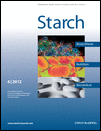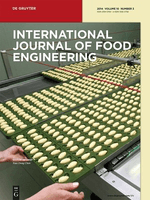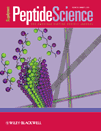
STARCH-STARKE
metrics 2024
Advancing Knowledge in Food Science and Organic Chemistry
Introduction
STARCH-STARKE is a prestigious journal published by WILEY-V C H VERLAG GMBH, focusing on the intricate fields of Food Science and Organic Chemistry. Established in 1949, this journal has carved a niche for itself as an essential resource for researchers and professionals seeking to explore the complexities of starch and its derivatives. With an impressive Scopus ranking—#139 in Food Science and #97 in Organic Chemistry—STARCH-STARKE holds a Q2 category position in both fields as of 2023, showcasing its significant impact and contribution to academic discourse. Although it does not offer open access options, the journal’s rigorous peer-review process ensures that the published content maintains the highest quality standards, making it an invaluable reference for students and seasoned researchers alike. With coverage spanning from 1949 to the present, STARCH-STARKE remains at the forefront of innovation in starch research, addressing both theoretical and practical applications.
Metrics 2024
 0.51
0.51 2.60
2.60 2.90
2.90 100
100Metrics History
Rank 2024
Scopus
IF (Web Of Science)
JCI (Web Of Science)
Quartile History
Similar Journals

International Food Research Journal
Nurturing Interdisciplinary Dialogue in Food StudiesThe International Food Research Journal, published by UNIV PUTRA MALAYSIA PRESS, serves as a pivotal platform for disseminating innovative research within the field of food science. With an ISSN of 1985-4668 and an E-ISSN of 2231-7546, the journal has successfully established its presence since its inception in 2007, converging its findings through 2024. This esteemed journal holds a Q3 ranking in Food Science, illustrating its valuable contributions to the field as demonstrated by its Scopus rank of 276 out of 389, placing it in the 29th percentile among its peers in Agricultural and Biological Sciences. Although it operates under a traditional publishing model, its academic integrity and focus on high-quality research ensure that it remains a vital resource for researchers, professionals, and students eager to explore advances in food technology, nutrition, and safety. By encouraging interdisciplinary collaboration and critical dialogue, the International Food Research Journal plays an essential role in shaping the future of food science research.

ACS Food Science & Technology
Innovating Food Science with Cutting-Edge TechnologyACS Food Science & Technology is a premier peer-reviewed journal published by the American Chemical Society (ACS) that addresses the dynamic intersections of food science, chemistry, and technology. With its E-ISSN: 2692-1944, this journal aims to disseminate innovative research and comprehensive reviews that enhance understanding in fields such as analytical chemistry, organic chemistry, and general food science. Despite the absence of an Open Access model, its position in the Q2 quartile for multiple categories in 2023 underscores its significant impact on the scholarly landscape, ensuring researchers can access high-quality research pertinent to today's food challenges. With an expanding timeline of 2021 to 2024, ACS Food Science & Technology is poised to be an essential resource for advancing the scientific community's knowledge, fostering collaboration, and bridging gaps between academia and industry.

Food Biophysics
Delving into the Biophysics of Food InnovationWelcome to Food Biophysics, an esteemed journal published by SPRINGER, dedicated to advancing the field of food science through the lens of biophysics. With an ISSN of 1557-1858 and an E-ISSN of 1557-1866, this journal provides a platform for the dissemination of innovative research from 2006 to 2024. Food Biophysics holds a distinguished position in the academic community, boasting a Q1 ranking in Food Science and Q2 rankings in Analytical Chemistry, Applied Microbiology and Biotechnology, Bioengineering, and Biophysics. This positions the journal in the 73rd percentile for Food Science, signifying its relevance and influence in the field. Although not Open Access, it remains an invaluable resource for researchers, professionals, and students interested in the intricate biophysical properties of food materials and processes. Explore cutting-edge findings that bridge disciplines and advance our understanding of how biophysics can innovate food preservation, safety, and quality.

ITALIAN JOURNAL OF FOOD SCIENCE
Fostering Collaboration in Food ResearchITALIAN JOURNAL OF FOOD SCIENCE is a distinguished open-access publication dedicated to advancing knowledge in the field of food science, catering to a global audience of researchers, professionals, and students. Published by Codon Publications in Singapore, this journal, operating under the ISSN 1120-1770 and E-ISSN 2239-5687, has been a vital platform for scholarly discourse since its inception in 1996, converging towards a comprehensive view of food science trends through 2024. With an impressive ranking in the third quartile (Q3) of the Food Science category and a Scopus rank of #151 out of 389, the journal plays a significant role in disseminating high-quality research, contributing to a richer understanding of food science within the agricultural and biological sciences. Since transitioning to open access in 2008, it has further expanded its reach, ensuring that innovative research is accessible to all, thereby fostering collaboration and knowledge exchange in this vital industry.

JOURNAL OF POLYMERS AND THE ENVIRONMENT
Unveiling the Synergy of Polymers and Environmental StewardshipJOURNAL OF POLYMERS AND THE ENVIRONMENT, published by Springer, is a leading academic journal in the fields of environmental engineering and materials chemistry, providing a vital platform for researchers, professionals, and students engaged in the study of polymers and their environmental impacts. With an impressive impact factor, the journal has established itself as a crucial resource in both the Q1 and Q2 quartiles for its respective categories, demonstrating its high-quality contributions to the scientific community. The journal, with ISSN 1566-2543 and E-ISSN 1572-8919, has been active since 2000 and continues to evolve as it converges towards 2024, ensuring it stays at the forefront of innovative research. Researchers will find the journal’s comprehensive analysis of polymers and sustainability foster a thorough understanding of contemporary issues while contributing to the sustainable development of materials. With an ever-expanding repository of open access content, the journal ensures wide dissemination of valuable knowledge, making it an essential aspect of the academic landscape in the United States and beyond.

INTERNATIONAL JOURNAL OF POLYMER ANALYSIS AND CHARACTERIZATION
Shaping the future of polymer research through rigorous inquiry.International Journal of Polymer Analysis and Characterization is a distinguished scholarly publication dedicated to the field of polymer science, with a focus on innovative methodologies and significant advances in the analysis and characterization of polymeric materials. Published by Taylor & Francis Ltd in the United Kingdom, this journal serves as a vital resource for researchers, professionals, and students deeply engaged in Analytical Chemistry, Chemical Engineering, and Polymer Science. With a convergence spanning from 1995 to 2024, it holds a Q3 ranking in the 2023 category quartiles for its valuable contributions to the fields of Analytical Chemistry, Chemical Engineering, and Polymers and Plastics. Despite being a non-open access publication, its rigorous peer-review process and comprehensive coverage of current trends ensure that the journal remains a crucial platform for disseminating impactful research. The journal is indexed in various databases, underscoring its relevance and quality in the academic community. Exploratory studies and articles that push the boundaries of polymer analysis find a welcoming home within these pages, making it an essential read for those aiming to stay at the forefront of polymer research.

International Journal of Food Engineering
Pioneering Research for a Sustainable Food FutureThe International Journal of Food Engineering, published by WALTER DE GRUYTER GMBH, serves as a pivotal platform for cutting-edge research in the field of food engineering. With an ISSN of 2194-5764 and an E-ISSN of 1556-3758, this journal focuses on innovative technologies, production processes, and quality control within food systems. Located in Germany, the journal has gained notable recognition, as reflected in its Scopus rankings, which place it within the 61st percentile in miscellaneous engineering and the 50th percentile in food science. Although it operates under a traditional access model, the journal's striking category quartiles signify its importance: achieving Q2 in Engineering and Q3 in both Biotechnology and Food Science in 2023. By fostering interdisciplinary research, the International Journal of Food Engineering aims to connect scientists, engineers, and industry professionals, ultimately contributing to advancements in food safety, sustainability, and nutrition. Join a vibrant community of experts driving innovation and addressing global food challenges through your contributions to this esteemed journal.

Food Chemistry: Molecular Sciences
Driving Discovery in Food Chemistry and BeyondFood Chemistry: Molecular Sciences is a leading academic journal published by ELSEVIER, dedicated to advancing knowledge in the fields of food science and molecular biology. With an ISSN of 2666-5662, this journal is a key platform for researchers and professionals aiming to disseminate innovative research findings from 2020 through 2024. Recognized for its quality, it stands in the Q1 category for Food Science and Q2 for Molecular Biology as of 2023, showcasing its commitment to high-impact publications. The journal is indexed in Scopus, earning ranks of #98/389 (74th percentile) in Agricultural and Biological Sciences - Food Science and #214/410 (47th percentile) in Biochemistry, Genetics and Molecular Biology - Molecular Biology. Each article represents cutting-edge research that drives the understanding and application of molecular principles in food chemistry, making it an essential resource for anyone involved in the field. Although this journal does not offer open access, its rigorous peer-review process ensures that the content is reliable and of significant academic value, contributing profoundly to the body of knowledge in the respective disciplines. Located in Amsterdam, Netherlands, Food Chemistry: Molecular Sciences continues to inspire scholarly discussion and innovation within the scientific community.

FOOD TECHNOLOGY AND BIOTECHNOLOGY
Innovating Solutions for Sustainable Food ProductionFOOD TECHNOLOGY AND BIOTECHNOLOGY is a distinguished peer-reviewed journal published by the Faculty of Food Technology and Biotechnology, University of Zagreb, Croatia. Since its inception in 1993, this Open Access journal has become a crucial platform for disseminating innovative research in the fields of food science, biotechnology, and chemical engineering. With a commendable impact factor and consistent Q2 and Q3 rankings across multiple categories—including Biotechnology, Food Science, and Industrial Engineering—this journal not only fosters academic discussions but also addresses real-world challenges in food production, safety, and sustainability. As it converges its thematic scope from 1996 to 2024, FOOD TECHNOLOGY AND BIOTECHNOLOGY remains committed to advancing knowledge through high-quality research and interdisciplinary collaboration, making it an essential resource for researchers, professionals, and students seeking to stay at the forefront of food innovation and biotechnology.

BIOPOLYMERS
Exploring the Intersection of Biology and MaterialsBIOPOLYMERS, a distinguished journal founded in 1963 and published by WILEY, serves as an essential platform for the dissemination of research in the fields of biochemistry, biomaterials, biophysics, and organic chemistry. With an ISSN of 0006-3525 and E-ISSN 1097-0282, this journal has been pivotal in advancing our understanding of the intricate roles that biopolymers play in various biological systems and their applications in medicine and technology. The journal is recognized for its rigorous peer-review process and has established itself within the academic community, boasting impressive Scopus rankings across multiple disciplines, including a Q2 ranking in both Biophysics and Medicine for 2023. Although it does not offer Open Access options, BIOPOLYMERS provides invaluable access to critical insights and developments in the study of biopolymers, appealing to researchers, professionals, and students dedicated to innovating in this dynamic field.